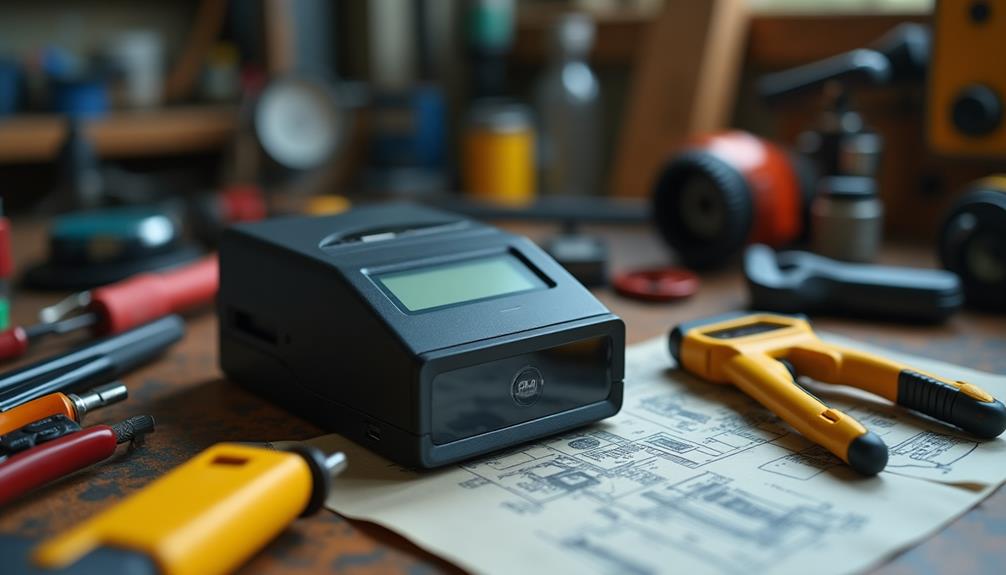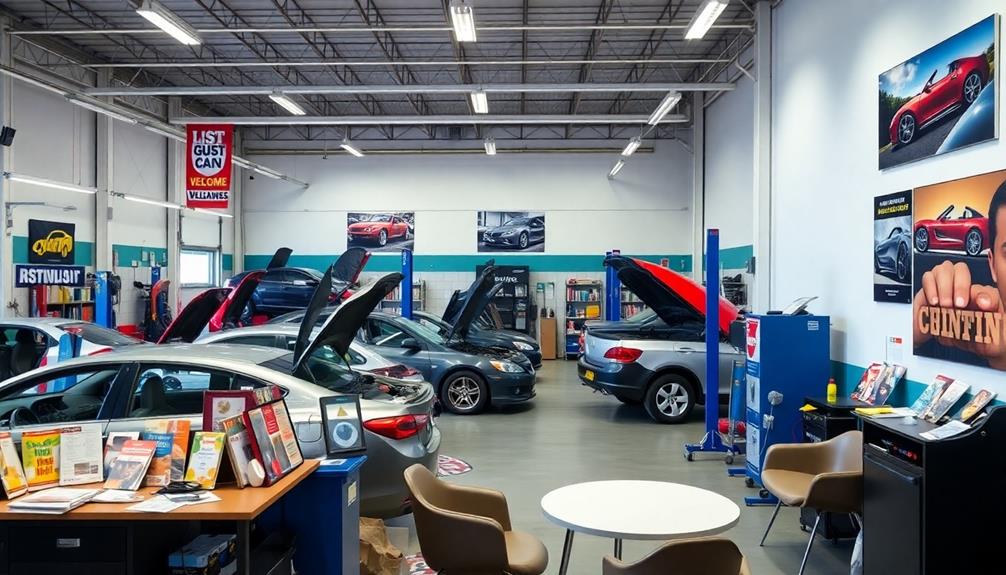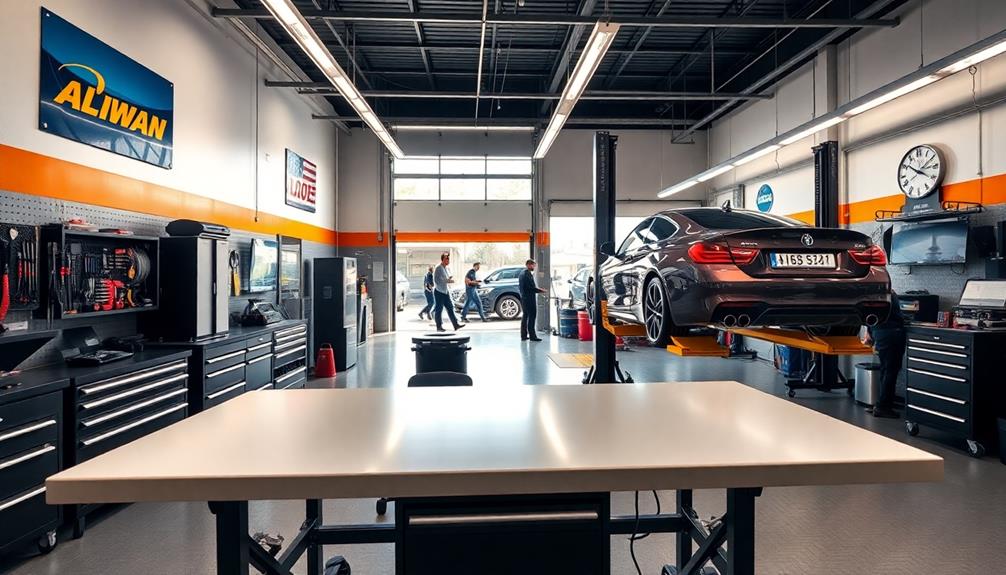Ask your mechanic, "What would you do if this were your own vehicle?" This question tends to cut through any sales tactics, prompting them to provide honest assessments. By putting them in a personal mindset, you encourage transparency about necessary repairs and services. When mechanics feel the pressure to be sincere, they're more likely to share insights without upselling unnecessary work. Building trust through clear communication is essential. So, if you want to know more tips to strengthen your relationship with your mechanic and guarantee you're getting the best service, keep exploring the topic further.
Key Takeaways
- Asking, "What would you do if this were your own vehicle?" encourages honest assessments and prioritizes your best interests.
- Requesting a written estimate ensures transparency and clarity about parts and labor costs.
- Inquiring about the rationale behind recommended repairs promotes open communication and trust.
- Clarifying the urgency of repairs helps prioritize necessary maintenance over upselling tactics.
- Observing the mechanic's response to your concerns can reveal their integrity and customer focus.
Understanding Mechanic Motivations

Understanding the motivations behind a mechanic's recommendations can save you time and money. Many mechanics are honest and genuinely want to help you maintain your vehicle, but they also face pressure to meet sales targets. This pressure often leads to upselling, especially since profit margins on small jobs can be low.
When you walk into a repair shop, remember that warranty repairs typically pay less than out-of-warranty ones, which might influence a mechanic's recommendations. It's important to evaluate financial aspects of care, such as financial considerations for elderly care, as these principles can apply similarly in various service industries.
Some mechanics prioritize higher-profit jobs over necessary maintenance, which can leave you feeling confused about what repairs are essential. However, many honest mechanics focus on building long-term relationships with customers rather than chasing short-term profits. They understand that trust is key in maintaining that rapport.
Building Trust With Your Mechanic
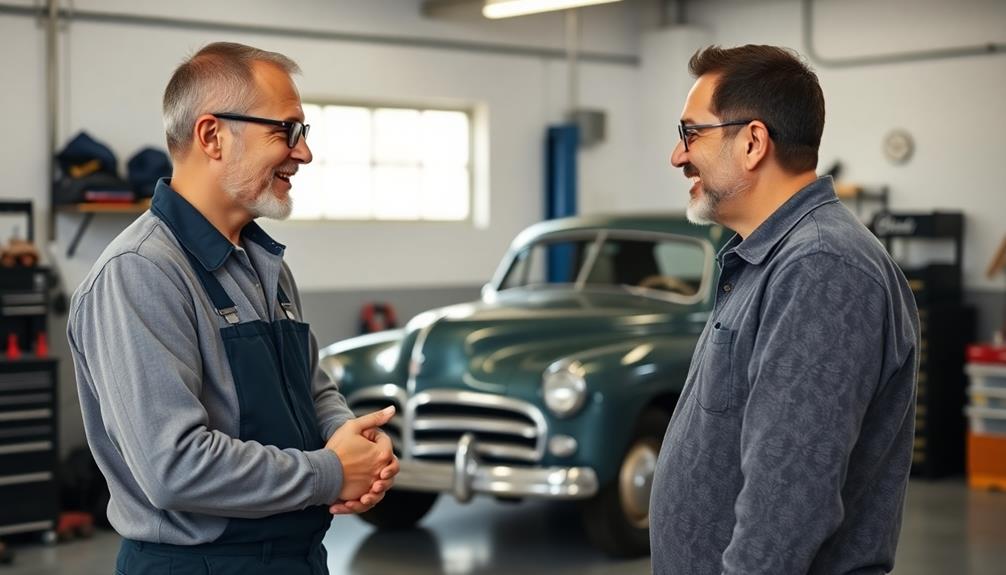
Building a strong relationship with your mechanic is key to receiving honest and reliable service. Establishing consistent communication enhances trust and leads to more transparent repair recommendations. When you engage regularly with your mechanic, it fosters a sense of reliability over time.
Requesting detailed written estimates can greatly boost transparency. By breaking down parts and labor costs, you hold your mechanic accountable for their pricing practices. Open dialogue about vehicle issues empowers you to make informed decisions, encouraging your mechanic to provide truthful assessments.
Engaging in regular maintenance and adhering to your owner's manual lays a solid foundation of trust. Mechanics are more likely to be upfront about necessary repairs when they see you're proactive about your vehicle's care.
Also, demonstrating knowledge about your vehicle and its maintenance history can deter dishonest practices. When mechanics realize you're informed and involved, they're less likely to exploit your trust.
Ultimately, building rapport with your mechanic is a two-way street. By prioritizing open communication and demonstrating your commitment to your vehicle, you'll cultivate a relationship that guarantees you receive honest and reliable service every time.
Key Questions to Ask
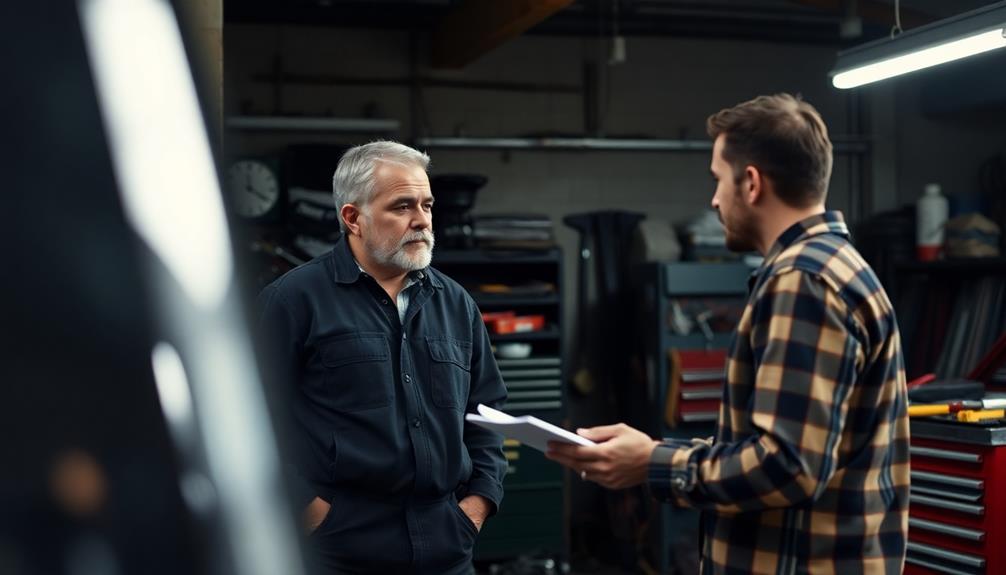
When you're at the mechanic's, asking the right questions can make all the difference in ensuring you receive honest service.
Start by asking, "What would you do if this were your own vehicle?" This question often prompts mechanics to provide a more truthful assessment of necessary repairs versus any upsells.
Next, explore the specifics by inquiring about the details and reasoning behind each recommended repair. This helps you gauge their transparency.
Don't forget to request a written estimate that breaks down parts and labor costs; this encourages mechanics to be upfront about pricing and any potential hidden charges.
Also, clarify the urgency of repairs by asking, "Which of these repairs needs immediate attention and why?" This distinction is significant for prioritizing your vehicle's needs.
Recognizing Red Flags

When you're getting your car serviced, keep an eye out for red flags that suggest something's off.
If you notice high-pressure sales tactics, unexplained cost increases, or a mechanic dismissing your concerns, it's time to question their integrity. These are all red flags that could indicate you’re not being treated honestly. It’s crucial to seek a second opinion or gather more information before making any decisions. For example, understanding the truth about tire pressure can prevent unnecessary adjustments or replacements that dishonest mechanics may suggest to pad their profits.
Trust your instincts—if it feels wrong, it probably is.
High-Pressure Sales Tactics
High-pressure sales tactics can leave you feeling uneasy and unsure about the services your vehicle truly needs. When dealing with a mechanic or shop, it's essential to recognize the signs of these tactics to protect yourself from unnecessary expenses.
| Red Flag | What It Indicates |
|---|---|
| Pushing for extensive repairs | Attempt to upsell unnecessary services |
| Notably lower prices | Potential for subpar service or hidden fees |
| Dismissing your complaints | Ignoring your genuine concerns |
| Urgency to complete repairs | Focus on profit rather than customer care |
Look out for mechanics who don't provide clear justifications for their recommendations. Transparency in service is key; if they avoid giving detailed explanations, they might not have your best interests in mind. Trustworthy shops will take the time to explain why a repair is necessary and break down costs transparently. Always ask questions and be wary if you sense pressure to make immediate decisions. Remember, a good mechanic values your trust and will prioritize your vehicle's needs over profit.
Unexplained Cost Increases
Unexpected charges on your repair bill can be a major source of frustration and distrust. When you receive an estimate for repair costs, you expect that to be a trustworthy figure. If you notice unexplained cost increases after the work is done, it raises red flags.
A reputable mechanic should provide a clear explanation for any changes in pricing. If they can't justify why your bill has risen, it might indicate a lack of transparency or an effort to upsell unnecessary services.
Understanding common financial terms related to budgeting and expenses can also empower you to manage your repair costs more effectively. Always request a written estimate that breaks down parts and labor costs. This documentation helps you identify discrepancies in final charges.
If the mechanic frequently gives estimates that are considerably lower than the final bill, consider this a warning sign of potentially deceptive practices or inadequate diagnostic assessments.
You deserve to understand why your repair costs have changed. A legitimate increase should come with a detailed explanation of additional issues discovered during the service, not vague justifications.
Stay vigilant and ask questions—it's your right as a customer.
Dismissive Attitudes Toward Concerns
A dismissive attitude from a mechanic toward your concerns can be a significant red flag. When you express worries about your vehicle, and they quickly brush you off as typical, it may signal a lack of transparency regarding the vehicle's actual condition. Mechanics prioritizing their profits over your best interests often push for extensive repairs without clear justification.
Here's a quick reference table to help you recognize these red flags:
| Red Flag | What It Indicates | Recommended Action |
|---|---|---|
| Dismissive attitudes | Lack of transparency | Seek a second opinion |
| High-pressure sales tactics | Potential dishonesty | Take your time to decide |
| Unexplained low prices | Subpar service or hidden costs | Research competitors |
| Lack of detailed estimates | They may not have your best interests in mind | Request clarification |
Trustworthy mechanics should be open and transparent about their recommendations and pricing. If you encounter dismissive attitudes, it's essential to question their integrity and prioritize your vehicle's needs. Always remember, your concerns deserve attention, and a mechanic should respect that.
Importance of Transparency
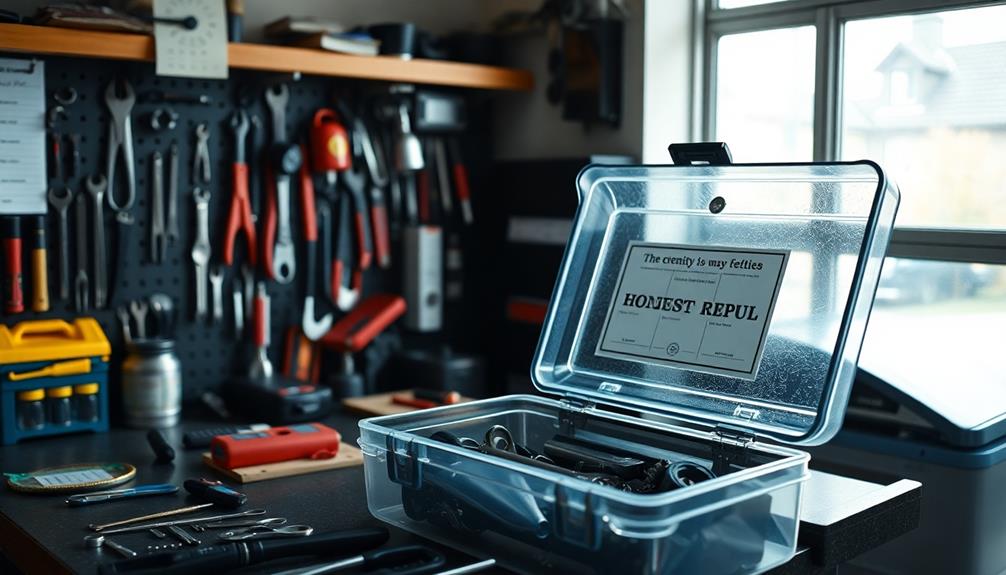
Transparency in auto repairs plays an important role in building trust between you and your mechanic. When mechanics communicate clearly about costs, repair processes, and necessary services, it fosters a positive relationship. You deserve to receive written estimates that detail parts and labor costs, along with explanations for recommended repairs. This way, you're informed and less likely to feel exploited.
When mechanics take the time to explain repair processes and the potential consequences of delaying repairs, it empowers you to make informed decisions about your vehicle's maintenance. Open dialogue about the choice of parts—whether OEM or aftermarket—helps you understand the implications these choices have on quality, warranty, and overall repair effectiveness.
Establishing transparency not only mitigates misunderstandings but also reduces the likelihood of accusations of dishonesty. You'll likely feel more satisfied with the service you receive when you know precisely what to expect.
In short, when mechanics prioritize transparency, they create an environment where trust flourishes, leading to a better experience for you as a customer. Make sure to seek out mechanics who embrace this important principle, as it can greatly impact your car care journey.
Enhancing Communication Skills
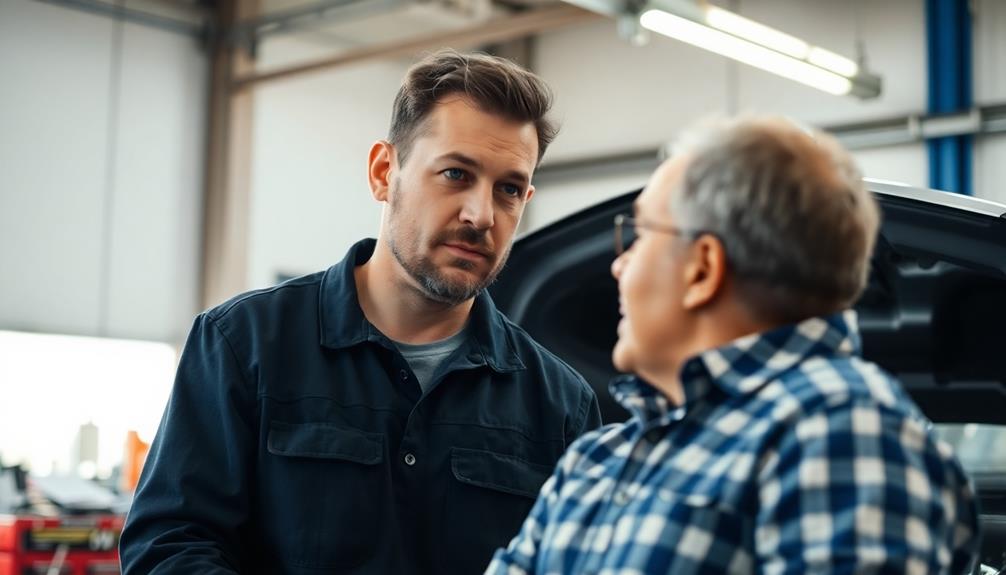
To enhance your communication skills as a mechanic, focus on providing clear repair explanations and transparent cost estimates.
Building trustworthy relationships with customers is key to fostering open dialogue and ensuring they feel comfortable discussing their vehicle concerns.
Clear Repair Explanations
Effective communication is key when it comes to clear repair explanations. As a mechanic, you should aim to break down complex issues into clear explanations that your customers can easily understand. This helps foster trust, as they'll feel informed and involved in the repair process.
Use layman's terms instead of technical jargon, so your customers know exactly what's happening with their vehicles.
Visual aids can also enhance comprehension. By showing old parts or diagrams, you help customers grasp the necessity of specific repairs. This transparency not only clarifies the situation but also builds trust, as customers see you're open about the issues at hand.
Establishing rapport with your customers is essential. When they feel comfortable, they're more likely to engage in open discussions about repairs.
Tailoring your explanations to their individual needs and concerns can make a significant difference in their understanding and satisfaction.
Transparency in Cost Estimates
Providing clear and detailed cost estimates can greatly enhance your relationship with customers. Transparency in pricing is essential; when you provide written estimates that break down parts and labor costs, it builds trust and keeps customers informed.
Always avoid hidden fees, as they can lead to dissatisfaction and suspicion. If a customer refuses to offer a detailed written quote, it's a red flag. Insist on understanding every aspect of the costs involved, including whether parts are OEM or aftermarket.
This clarity helps car owners differentiate between necessary repairs and suggested services, empowering them to make informed decisions. Moreover, communicate any potential risks associated with delaying repairs.
Customers appreciate knowing what's at stake, and this honesty fosters a more transparent relationship. When customers feel they're in the loop, they're more likely to trust your judgment and return for future services.
Trustworthy Mechanic Relationships
Trust is the cornerstone of a successful relationship between you and your mechanic. When you establish a consistent relationship with a trustworthy mechanic, communication flourishes. You'll find it easier to discuss your vehicle's repairs and maintenance needs transparently.
A good mechanic prioritizes clear explanations about the work being done, fostering an environment where you can ask questions without hesitation.
Look for mechanics with professional certifications like ASE or ASA. These qualifications often indicate a commitment to ethical practices, enhancing the reliability of their advice.
When a mechanic provides written estimates that detail parts and labor costs, it demonstrates transparency and solidifies trust in their recommendations.
Regular maintenance and open dialogue about your vehicle's issues empower you as a customer. This proactive approach not only helps you make informed decisions but also reinforces your trust in your mechanic.
Over time, this trust can lead to repeat business, as you feel confident in their expertise and integrity. Building a trustworthy mechanic relationship enhances your overall experience and guarantees your vehicle remains in good hands.
Frequently Asked Questions
How to Know if a Mechanic Is Telling the Truth?
To know if a mechanic's telling the truth, ask for a detailed estimate, inquire about warranties, and seek a second opinion. Pay attention to their explanations; honest mechanics answer your questions clearly and directly.
What to Do if a Mechanic Cheats You?
If you suspect a mechanic's cheated you, document everything. Ask to see replaced parts, consult consumer protection agencies, and get a second opinion. If needed, explore legal options for recovering your costs.
How Do Mechanics Know What's Wrong With a Car?
When you hand over your keys, mechanics become detectives, using tools and experience to uncover hidden truths. They inspect, diagnose with codes, and rely on road tests to reveal your car's secrets and restore its energy.
Are Mechanics Always Right?
No, mechanics aren't always right. They can misdiagnose issues or recommend unnecessary repairs. Establish a relationship with a trusted mechanic, and stay informed about your vehicle to guarantee you get honest assessments and reliable service.
Conclusion
By asking the right questions, you can shine a light on the shadows that often cloud auto repairs. Trust isn't just about knowing the tools; it's about understanding the person holding them. Equip yourself with knowledge, watch for red flags, and foster open communication. When you build that bridge of honesty with your mechanic, you'll not only drive away with peace of mind but also a smoother ride on the road of car ownership.

